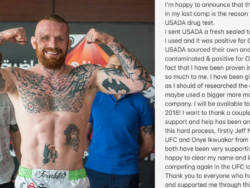The trouble with Ostarine: Jimmy Wallhead’s
16th March 2018
Features


Dillian Whyte was cleared to fight Oscar Rivas in London on 20 July by the British Boxing Board of Control (BBBofC), UK Anti-Doping (UKAD) and the Voluntary Anti-Doping Association (VADA) after returning a positive test, his promoter Eddie Hearn has stated. Hearn announced that the bodies had cleared the boxer on Twitter, adding that Whyte would make a statement later today in an interview with FightHubTV. Whyte won the fight to take the World Boxing Council (WBC) Interim Heavyweight belt.
Further to reports I can confirm that both Dillian Whyte and Oscar Rivas were subject to extensive VADA and UKAD testing for their bout. Both fighters were cleared to fight by both bodies and the BBBofC
— Eddie Hearn (@EddieHearn) July 24, 2019
A positive test, known as an adverse analytical finding (AAF), does not necessarily mean that an athlete has committed an anti-doping rule violation (ADRV). Under anti-doping procedure, an athlete has the possibility to explain the presence of a prohibited substance in their physiology.
An athlete’s sample is split into an A sample and a B sample, which is stored. If analysis of the A sample reveals an AAF, an athlete has the right to request analysis of their B sample if they dispute the AAF. It is understood that Whyte has done this.
Whyte returned an AAF for epimethandienone and hydroxymethandienone, metabolites of Dianabol, reports BoxingScene. It is understood that the concentrations of the metabolites in Whyte’s sample were very small and consistent with ingestion of a supplement.
As a recent USADA statement outlines, manufacturers are not always truthful about supplement ingredients. ‘A mandatory Provisional Suspension may be eliminated if the athlete demonstrates to the hearing panel that the violation is likely to have involved a Contaminated Product’, reads Article 7.9.1 of the World Anti-Doping Code.
It is understood that Whyte’s AAF occurred on 17 July. Had the BBBofC suspended Whyte, it may have made itself vulnerable to a lawsuit. The dangers of such an approach have been thrown into sharp relief by recent cases involving Mamadou Sakho and Sun Yang.
As the case is ongoing, the exact circumstances are not known. UKAD has told The Sports Integrity Initiative that it cannot comment on ongoing procedures, and the BBBofC has issued a similar statement.
‘The WBC has not received any notification from anyone about a positive anti-doping test allegedly yielded by Dillian Whyte in connection with last Saturday’s fight against Oscar Rivas for the WBC Interim Heavyweight Championship’, read a WBC statement. ‘The WBC has requested that the BBBofC, as the local, governing entity that oversaw that fight, formally provide any available information to the WBC. The fight’s promoters contracted the Voluntary Anti-Doping Association (VADA) to perform pre-fight and after-the-fight anti-doping tests on both fighters. The WBC is not aware that any of the test’s results VADA has received up to now have yielded any adverse findings. The WBC created the Clean Boxing Program which is administered by VADA, and which is a top priority of our organization. The WBC will not make any comments about the situation at hand until it receives the proper, formal communication from the BBBofC.’
• Eleven athletes (and a horse trainer) from eleven countries, competing in nine sports, were...
• 20 athletes from nine countries, competing in ten sports, were involved in anti-doping proceedings...
• Twenty four athletes from 13 countries, competing in eight sports, were involved in anti-doping...